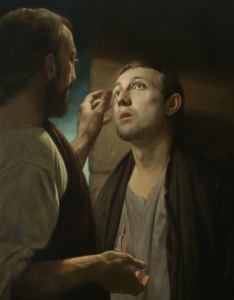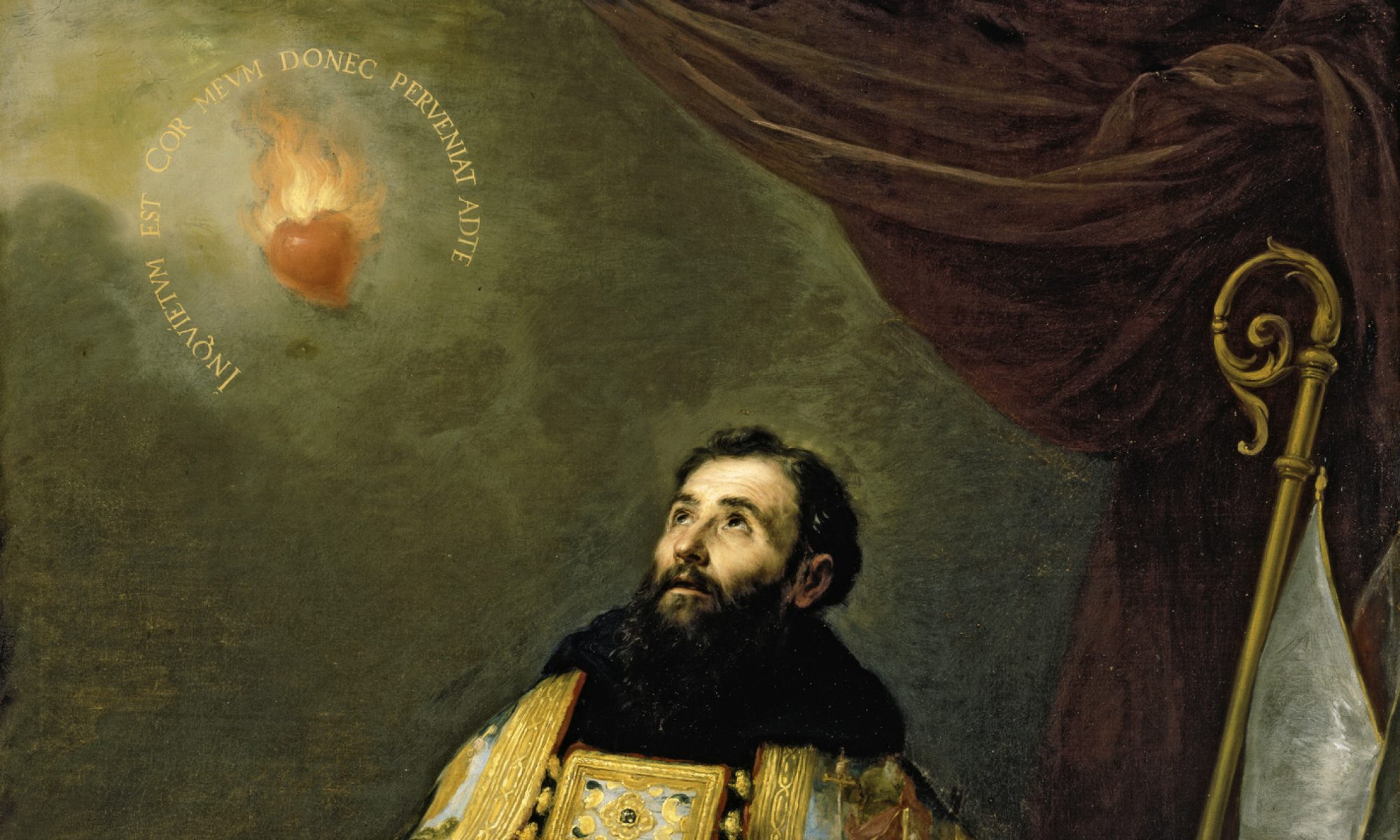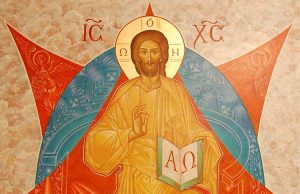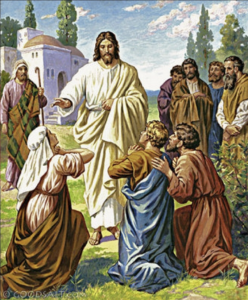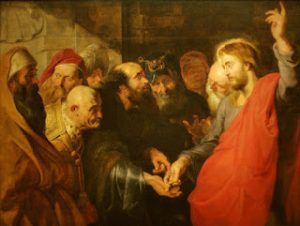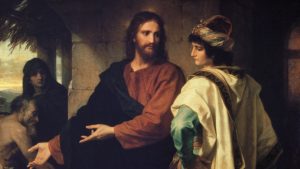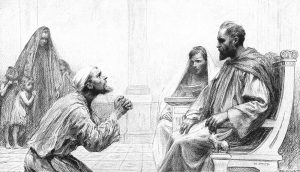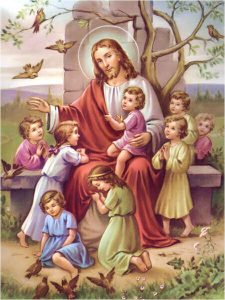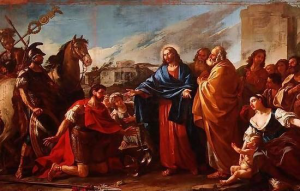Today is the 30th Sunday in Ordinary Time, Year B. A week from now, on November 5th, we will exercise our right of suffrage. Probably, some of us have already sent our ballots by mail, and some are anxious to cast votes in person on election day. I don’t want to appear political, but I remind everyone to pray for a peaceful and orderly election. Let us pray for wisdom to know that we need God to lead us to a right decision which conforms to the teachings of Christ and His Church. Reject those propositions that are contrary to our Christian belief; resist evil! Focusing on politician personalities is not important, but political agendas are necessary to scrutinize according to a well-informed conscience to have a better view on all the pressing issues our nation is presently dealing with. The blindness about social reality is losing a sense of connection being an integral part of a bigger family. We must do a clean-up of our inner selves and enjoy the benefits of seeing the goodness of God which we are responsible to share with others. Decision is in your hands, with the guidance of the Holy Spirit.
The year 2019 was the toughest year of my life. I experienced losing my eyesight because of too much pressure, and small veins at the back of my eye started to creep in towards my pupil, becoming enflamed, which gradually emitted blood, creating floaters and impeding my vision. I have had two eye surgeries, and sometime in December I will have another surgery on my right eye. I am presently having regular bi-monthly eye injections. It is tough, and I never thought that it would happen to me. At the altar celebrating mass, I only see images of people and cannot identify those who are sitting in the front pew. What a terrible experience; however, I’ve learned to empathize with people who have impaired vision, are visually handicapped, or are blind. The gospel today inspires me to follow the abiding faith of Bartimaeus as he begs Jesus to have pity on him. In the same manner, I too humbly pray to God for complete healing.
We heard three readings of the liturgy which reveal God’s goodness and power to heal. From the Prophet Jeremiah in the first reading, he speaks of shouting for joy resulting in a promise of reestablishment of unity among separated nations under one God of David. As a result, they had their freedom back and the knowledge of their true identity as God’s holy people. The chosen people had the opportunity to return to their homeland. The blind will not stumble along the level road nor will families be displaced from their children. God gathered them and sustained the chosen people as His beloved.
The 2nd reading, taken from the letter to the Hebrews, speaks about the role of the High Priest, who represents God to men and men to God. He would serve God faithfully as His appointed and live humbly. Jesus’ humanity allowed Him to be perfectly fulfilling this role. Jesus, being the High Priest, offered Himself as a sacrifice for the remission of sins through His perfect obedience. This clearly affirms that it was not Christ who glorified Himself in becoming high priest, but the one who said, “You are my Son, this day I have begotten you; just as he says in another place: You are a priest forever according to the order of Melchizedek.”
The gospel, taken from the evangelist St. Mark, is a story about a blind man named “Bartimaeus.” He was among the crowd waiting for Jesus to arrive; however, he was at the periphery of the road sitting with deep faith and patience despite the humiliating attitude shown by the crowd towards him. Upon Jesus getting near, he did not hesitate to call Jesus, “Son of David.” Let us enter into the most touching episodes in the gospel today.
First, the blind man called Jesus’ name with humility and profound trust that Jesus, who is the High Priest, the Lord whom he acknowledged as “the Son of David,” would surely give him hope. However, the crowd is telling the blind man to stop praying and calling Jesus. They wanted to silence him. This gospel unfolds the attitude of the crowd, the Apostles and other disciples of the Lord, who had directly seen Christ’s miracles and heard Jesus’ preaching, yet are blinded to accept Jesus’ messianic identity, as compared to this blind man who truly believed and accepted Jesus.
Second, Jesus was aware of the blind man’s presence in the midst of the crowd and called him and encouraged him to hurry to come near Him. Jesus asked him, “What do you want me to do for you?” The blind man simply said, “Master, I want to see.” Jesus healed his sight, and with his unwavering faith, the blind man became a follower of Jesus.
Third, Jesus answered his prayer with these words, “Go your way, your faith has saved you.” Bartimaeus‘ eyes were opened, and he saw wonderful sights around him. He was delighted to see the world made real. The crowd stood still hearing the guidance of Jesus’ words.
Brothers and sisters, Jesus is constantly passing by us all and asking us what we want Him to do for us despite our weaknesses, and fragilities experiencing spiritual blindness. We must look to Jesus in order to be healed and humbly ask Him for the grace of recovery of sight to enjoy the beauty and meaning of life, which is a loving and delightful relationship with God. The restoration of our spiritual vision that enables us to work to do the mission of Jesus to bring to life especially those who are brokenhearted, desperate and hopeless.
This is how the role of the Church becomes effective. We, who are believers of Jesus, through us must invite and encourage others to follow Jesus into generous ministry and relationships with God rather than an obstacle and scandal to others. There are many opportunities to improve our impaired vision by looking for possible ways to think and visualize who we are in God’s eyes. Let us get up to join the blind man on the side of the road in his prayer, “Have pity on me.” Then follow Jesus into His generous service by offering ourselves less blindly.
God bless you.
Fr. Arlon, osa
————–
El Dictado del Corazón
Trigésimo Domingo del Tiempo Ordinario, Año B
- Jeremías 31:7-9
- Salmo 126:1-2, 2-3, 4-5, 6
- Hebreos 5:1-6
- Marcos 10:46-52
Hoy es el Trigésimo Domingo del Tiempo Ordinario, Año B. El cinco de noviembre, ejerceremos nuestro derecho a votar. Probablemente, algunos ya enviamos nuestras papeletas por correo y otros están ansiosos por emitir su voto en persona el día de las elecciones. No quiero parecer político, pero les recuerdo a todos que oremos por una elección pacífica y ordenada, también oremos por sabiduría, para que Dios nos guíe a tomar la decisión correcta que se ajuste a las enseñanzas de Cristo y Su Iglesia. Rechacemos aquellas proposiciones que son contradictorias a nuestra creencia cristiana y resistamos al mal. No es importante centrarse en las personalidades políticas, pero es necesario examinar una agenda política de acuerdo con una conciencia bien informada, para tener una mejor visión de todos los problemas urgentes que enfrentan nuestras naciones en la actualidad. La ceguera sobre la realidad social está perdiendo el sentido de conexión al ser parte integral de una familia más grande. Debemos hacer una limpieza de nuestro ser interior y disfrutar de los beneficios de ver la bondad de Dios, que somos responsables de compartir con los demás. La decisión está en sus manos, con la guía del Espíritu Santo.
El dos-mil-diecinueve, fue uno de los años más duros de mi vida. He experimentado la pérdida de la vista debido a demasiada presión y pequeñas venas en la parte posterior de mi ojo, que comienzan a arrastrarse hacia mi pupila inflamándola, lo que gradualmente emite sangre, crea flotadores e impide mi visión. Me sometí a dos cirugías oculares y en algún momento en el mes de diciembre, tendré otra cirugía en mi ojo derecho. Actualmente, me estoy poniendo inyecciones oculares regulares cada dos meses. Es duro y nunca pensé que me pasaría a mí. En el altar celebrando la misa, solo veo imágenes de personas, pero no puedo identificar quién está sentado en el primer banco. Es una experiencia terrible, sin embargo, aprendí a empatizar con las personas con problemas de visión, discapacitados visuales y personas ciegas. El evangelio de hoy me inspira a seguir la fe permanente de Bartimeo cuando le ruega a Jesús que tenga piedad de él. De la misma manera, yo también humildemente oro a Dios por una sanación completa.
Escuchamos tres lecturas de la liturgia que revelan la bondad y el poder de Dios para sanar. Del profeta Jeremías, la primera lectura, habla de gritar de alegría que resultó en una promesa de restablecimiento de la unidad entre las naciones separadas bajo un solo Dios de David. Como resultado, recuperaron su libertad y el conocimiento de su verdadera identidad como pueblo santo de Dios. El pueblo elegido tuvo la oportunidad de regresar a su patria, los ciegos no tropezarán en el camino, ni las familias serán desplazadas de sus hijos. Dios los reunió y sostuvo al pueblo elegido como Su amado.
La segunda lectura tomada de la carta a los Hebreos, habla sobre el papel del Sumo Sacerdote, que representa a Dios ante los hombres y los hombres ante Dios. Serviría a Dios fielmente como Su designado y viviría humildemente. La humanidad de Jesús le permitió cumplir perfectamente este papel. Jesús, siendo el Sumo Sacerdote, se ofreció a sí mismo como sacrificio para la remisión de los pecados mediante su perfecta obediencia. Esto afirma que no fue Cristo quien se glorificó a sí mismo al convertirse en sumo sacerdote, sino aquel que dijo: “Tú eres mi Hijo, yo te he engendrado hoy; como dice en otro lugar: Tú eres sacerdote para siempre según el orden de Melquisedec”.
El evangelio tomado de San Marcos es una historia sobre un hombre ciego llamado “Bartimeo”. Él estaba entre la multitud esperando que Jesús llegara; sin embargo, estaba en la periferia del camino sentado con profunda fe y paciencia a pesar de la actitud humillante que mostraba la multitud hacia él. Al acercarse Jesús, no dudó en llamarlo “Hijo de David”. Entremos en los puntos más conmovedores del evangelio de hoy.
Primero, el ciego, llamó el nombre de Jesús con humildad y profunda fe en que Jesús, quien es el Sumo Sacerdote, el Señor a quien reconoció como “el Hijo de David”, seguramente le daría esperanza. Sin embargo, la multitud le dice al ciego que deje de orar y de llamar a Jesús. Querían silenciarlo. Este evangelio despliega la actitud de la multitud, los Apóstoles y otros discípulos del Señor que habían visto directamente los milagros de Cristo y oído la predicación de Jesús, pero que estaban cegados para aceptar la identidad de Jesús como el mesías, en comparación con este hombre ciego que verdaderamente creyó y aceptó a Jesús.
En segundo lugar, la conciencia de Jesús de su presencia en medio de la multitud, lo llamó y animó al hombre ciego a apresurarse para acercarse a Él. Jesús le preguntó: “¿Qué quieres que haga por ti?”. El hombre ciego simplemente dijo: “Maestro, quiero ver”. Jesús sanó su vista y, con su fe inquebrantable, se convirtió en un seguidor de Jesús.
En tercer lugar, Jesús respondió a su oración con estas palabras: “Vete, tu fe te ha salvado”. Los ojos de Bartimeo se abrieron y vio maravillado a su alrededor, encantado de ver que el mundo se hacía realidad. La multitud se quedó quieta escuchando la guía de las palabras de Jesús.
Hermanos y hermanas, Jesús pasa constantemente junto a todos nosotros y nos pregunta qué queremos que Él haga por nosotros, a causa de nuestras debilidades y fragilidades para experimentar nuestra ceguera espiritual. Debemos buscar a Jesús para ser sanados y pedirle humildemente la gracia de experimentar la recuperación de la vista para disfrutar de la belleza de la vida y la relación amorosa y placentera con Dios. La restauración de nuestra visión espiritual nos permite trabajar, hacer la misión de Jesús de traer a la vida especialmente a aquellos que están quebrantados de corazón, desesperados y sin esperanza.
Así es como el papel de la Iglesia se vuelve efectivo. Nosotros, que somos creyentes de Jesús, a través de nosotros debemos invitar y alentar a otros a seguir a Jesús en un ministerio y relaciones generosas. Hay muchas oportunidades de dañar nuestra capacidad de mejorar nuestra visión deteriorada al buscar formas posibles de pensar y visualizar quiénes somos a los ojos de Dios. Levantémonos para unirnos al ciego al costado del camino en su oración: “Ten compasión de mí”. Entonces sigamos a Jesús en su generoso servicio ofreciéndonos ciegamente a Él.
Dios los bendiga.
Padre Arlon, osa
